 Petzlover
Petzlover Beauceron is originated from France but Welsh Terrier is originated from United Kingdom. Beauceron may grow 32 cm / 13 inches higher than Welsh Terrier. Beauceron may weigh 40 kg / 89 pounds more than Welsh Terrier. Both Beauceron and Welsh Terrier has same life span. Both Beauceron and Welsh Terrier has almost same litter size. Beauceron requires Low Maintenance. But Welsh Terrier requires Moderate Maintenance
Beauceron is originated from France but Welsh Terrier is originated from United Kingdom. Beauceron may grow 32 cm / 13 inches higher than Welsh Terrier. Beauceron may weigh 40 kg / 89 pounds more than Welsh Terrier. Both Beauceron and Welsh Terrier has same life span. Both Beauceron and Welsh Terrier has almost same litter size. Beauceron requires Low Maintenance. But Welsh Terrier requires Moderate Maintenance
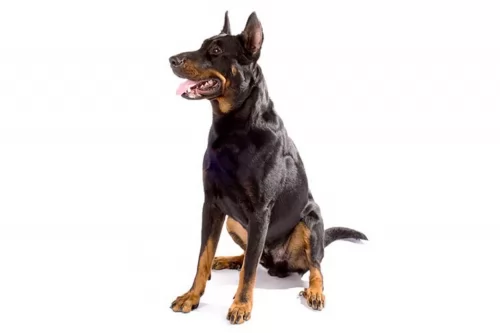 Sometimes referred to as the king of sheepdogs, the Beauceron is a French dog breed that happens to be an extraordinary herding dog too. He instinctively rounds up livestock without even being trained to do so. The dog is also known as Berger de Beauce, originating from the Beauce region in France and is closely related to the Briard or Berger de Brie.
Sometimes referred to as the king of sheepdogs, the Beauceron is a French dog breed that happens to be an extraordinary herding dog too. He instinctively rounds up livestock without even being trained to do so. The dog is also known as Berger de Beauce, originating from the Beauce region in France and is closely related to the Briard or Berger de Brie.
This French breed’s origin goes back to the late 16th century, and the Beauceron was divided into two working types way back in 1863 - the dog with the long coat was known as Berger de Brie or Briard while the short-coated dog became known as Beauceron. It was in 1922 that a club for this dog breed was established, and the Beauceron Club of America was established in 1980, only recently receiving recognition by the American Kennel Club.
 Originating in Wales and bred to hunt the Welsh Terrier might be the oldest dog breed from the U.K. still in existence today. They were bred to hunt badgers, rodents, and fox. Today however they are mostly bred for show and companionship.
Originating in Wales and bred to hunt the Welsh Terrier might be the oldest dog breed from the U.K. still in existence today. They were bred to hunt badgers, rodents, and fox. Today however they are mostly bred for show and companionship.
There are only two breeds of terrier that are native to the country of Wales, the Welsh and the Black and Tan Rough Terrier. It is believed that the Welsh Terrier was descended from that Black and Tan Rough Terrier in the 18th and 19th centuries. The Welsh Terrier was separated out as a separate breed in the late 1700s.
This breed was hunting with the Otterhounds of Wales and was called a Ynysfor. At the same time their was a breed in England, the Old English Broken Haired Terrier. Both breeds were incredibly alike and once the Ynysfor or Welsh Terrier was recognized by the English Kennel Club in 1886. When shown together they were considered the same breed.
Even though all these dogs from Wales and England were considered to be Welsh Terriers, the breed was not recognized until 1886. It is currently on the list of threatened breeds, with only 300 puppies registered every year. They were the 45th breed to be recognized by the English Kennel Club and the AKC. They are recognized by 14 clubs and registries.
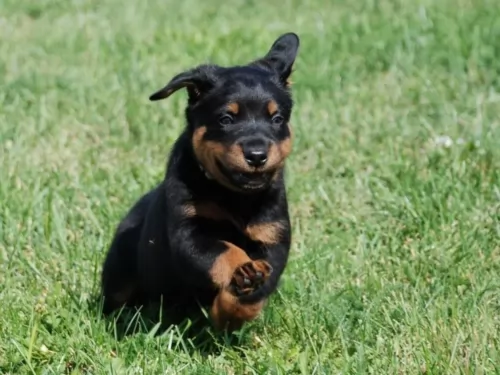 The Beauceron is an intelligent dog, just by looking at the alert, bright face. He is a muscular, large dog breed, standing up to 71cm in height and weighing in at up to 50kg. You’ll recognize him with his dark black coat with red markings, particularly around the feet, which interestingly gives this breed the French nickname Bas Rouge. It means red stockings. Harlequin, tri-coloured grey, black and tan is also recognized as a color.
The Beauceron is an intelligent dog, just by looking at the alert, bright face. He is a muscular, large dog breed, standing up to 71cm in height and weighing in at up to 50kg. You’ll recognize him with his dark black coat with red markings, particularly around the feet, which interestingly gives this breed the French nickname Bas Rouge. It means red stockings. Harlequin, tri-coloured grey, black and tan is also recognized as a color.
The coat is rough, short and dense, the alert eyes dark brown and the ears are set high and can be cropped or natural. The natural ears are half pricked or drop ears and are fairly short. Looking similar to the Doberman and Rottweiler but with a long tail, this French Shepherd dog is somewhat slimmer but with a foreboding appearance. He is solid, well proportioned and well muscled and gives the impression of strength. He has a tolerant nature and will fit in well with a family when trained and socialized.
 The Welsh Terrier is a medium sized breed that is compact and sturdy. They had docked tails in the past, but the practice is now illegal in the U.K. The dog is about as long as it is tall. The head and face are elongated with a beard and whiskers. Females are smaller than males, but both are compact and sturdy.
The Welsh Terrier is a medium sized breed that is compact and sturdy. They had docked tails in the past, but the practice is now illegal in the U.K. The dog is about as long as it is tall. The head and face are elongated with a beard and whiskers. Females are smaller than males, but both are compact and sturdy.
Eyes are almond shaped, dark brown and small. The ears are small and V shaped. They should not be thin. The muzzle is square and strong with a black nose. The lips are tight and they are also black.
They have a double coat with is rugged and wiry on top and the undercoat is insulative and softer. The coat is waterproof and protects from wind and dirt as well. The puppies are all black until about 9 months when they become black and tan. The legs, head and underbelly are tan, with a black saddle.
The Welsh Terrier has wiry hair on the legs, muzzle and quarters. The hair is very dense in the top coat. Their gait and movement is straight, effortless and free.
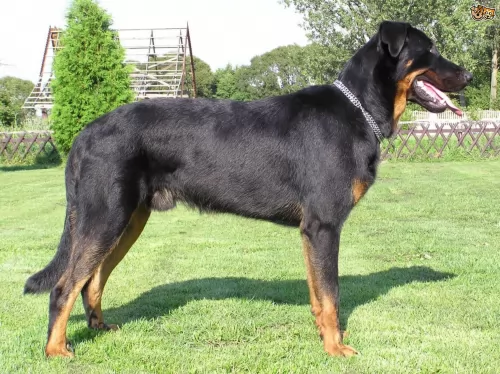 Strong, big, confident and good-looking the Beauceron makes an excellent watchdog, guarding the human family that he is so devoted too. He is a good friend and companion and is tolerant with children and other pets.
Strong, big, confident and good-looking the Beauceron makes an excellent watchdog, guarding the human family that he is so devoted too. He is a good friend and companion and is tolerant with children and other pets.
He is such a clever breed too, and its small wonder that he has always been sought after for hard work – herding, shepherding and even rescue work. When he’s not involved in working, at home, he’s just your big, devoted friend.
 1Children friendliness – The Welsh Terrier is good with kids and will follow them anywhere. They do want to play with the children by tugging on them and could cause a young child to fall. They can learn to play gently with small children.
1Children friendliness – The Welsh Terrier is good with kids and will follow them anywhere. They do want to play with the children by tugging on them and could cause a young child to fall. They can learn to play gently with small children.
3.Adaptability – They do fine in smaller indoor spaces as long as they have a robust exercise routine daily. They will be active indoors.
4.Learning ability -They are very smart, independent thinkers as can been seen by their ability to learn to play gently with small children. They need plenty of socialization early in life
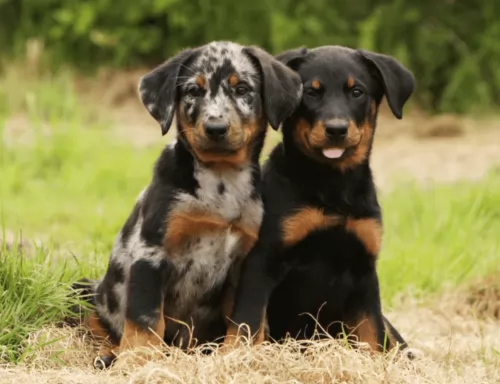 It’s such a nice strong, good-looking dog this, you can’t think of anything going wrong with him. His lifespan is anything from 10 to 14 years and the dog is pretty robust. Being a large breed and a pedigree, he is prone to some common ailments. When you suspect your beloved pet has any health issue, don’t hesitate to get him to the vet.
It’s such a nice strong, good-looking dog this, you can’t think of anything going wrong with him. His lifespan is anything from 10 to 14 years and the dog is pretty robust. Being a large breed and a pedigree, he is prone to some common ailments. When you suspect your beloved pet has any health issue, don’t hesitate to get him to the vet.
A painful disorder that affects larger dogs and brought about by an abnormal development in the joints.
Also a painful condition where the stomach twists so that the blood supply is cut off. Large breeds with deep chests are more prone to developing the condition. Rapid breathing and signs of pain can be indicative of this ailment.
 The Welsh Terrier is a fairly healthy hunting dog, though they do have some health issues.
The Welsh Terrier is a fairly healthy hunting dog, though they do have some health issues.
• Onychodystrophy – Nails grow weak and are very brittle. They can break easily and cause pain, irritation and even infections.
• Primary lens luxation – causes secondary glaucoma which can cause blindness.
• If hunting, they are exposed to hunting injuries and should be checked over well after a field adventure, whether hunting or in field trials.
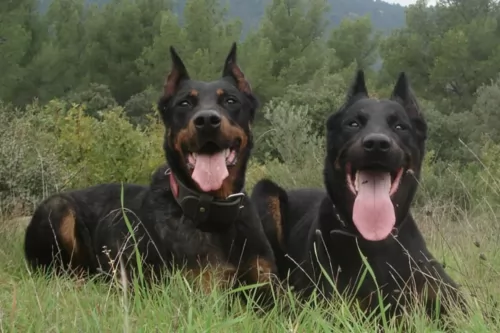 This is a large, hard-working, energetic dog and he will need high-quality food, whether commercially manufactured or home-prepared. The best commercially manufactured dog foods produce foods with the right balance of minerals and vitamins in keeping with your dog’s age, his activities and his stage of life (illness, senior, puppy). If you’re unsure about what to feed your Beauceron, speak to your vet to be 100% that you are meeting his nutritional demands, and always ensure a bowl of cool, clean water is constantly available.
This is a large, hard-working, energetic dog and he will need high-quality food, whether commercially manufactured or home-prepared. The best commercially manufactured dog foods produce foods with the right balance of minerals and vitamins in keeping with your dog’s age, his activities and his stage of life (illness, senior, puppy). If you’re unsure about what to feed your Beauceron, speak to your vet to be 100% that you are meeting his nutritional demands, and always ensure a bowl of cool, clean water is constantly available.
You’re lucky with the Beauceron as he is a low shedding, low maintenance dog with his short coat. He doesn’t require any trimming but will need a good brush twice a week to rid him of loose hairs. Clean his teeth with a special dog toothbrush and toothpaste to avoid plaque buildup. Never use human toothpaste. Clip his nails if he doesn’t wear them down naturally.
This is a big, strong, energetic dog, and you owe it to him to ensure he gets lots of exercise – runs, walks and ball games. If you can’t be a responsible dog owner, don’t own a breed like this as he can become destructive if not kept active.
 1.Feeding the puppy – the breed is prone towards obesity so do not overfeed wither the puppy or the adult. Watch the calorie level and make sure they get high quality, high protein feed meant for the breed or for medium sized dogs. Feed the puppies small amount 3-4 times per day.
1.Feeding the puppy – the breed is prone towards obesity so do not overfeed wither the puppy or the adult. Watch the calorie level and make sure they get high quality, high protein feed meant for the breed or for medium sized dogs. Feed the puppies small amount 3-4 times per day.
2.Feeding the adult - the breed is prone towards obesity so do not overfeed wither the puppy or the adult. Watch the calorie level and make sure they get high quality, high protein feed meant for the breed or for medium sized dogs. Feed the adult at least 2 times per day.
4. Games and Exercises Full of energy and requiring a routine outlet for that energy, the Welsh Terrier is an active dog. Just running around a fenced yard all day will not be enough physical and mental stimulation for them. If bored they can get into trouble. They need a job or a challenge. They love to swim and they love to chase. They do well in agility, field trials and barnhunt.